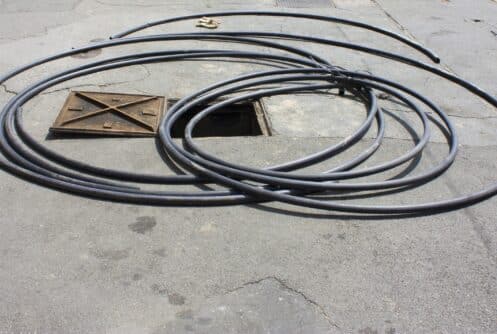Caring for your sewer pipes is an important aspect of maintaining your home’s overall health and safety. Your sewer system plays a vital role in removing waste and sewage from your home. When your sewer system is not functioning properly, it can lead to a range of problems, including leaks, backups, and water damage. In addition, neglected sewer pipes can lead to costly repairs and potentially hazardous conditions. Regular maintenance and care of your sewer pipes can help prevent these problems and ensure the long-term health and safety of your home.
Essential Steps to Care for Your Sewer Pipes
Caring for and maintaining your sewer pipes is an essential part of maintaining an efficient plumbing and elimination system in your home. In addition to procuring professional repair and service as needed, take these steps to proactively treat and protect your whole sewer system.
Watch What You Flush
Flushing non-degradable items such as paper towels, sanitary products, wipes, and other solid waste down toilets and drains can cause blockages in your sewer pipes. Coffee grounds should not be poured down the drain, as they can accumulate in your pipes and cause blockages. Eggshells and bones from meat and fish should not be disposed of in the toilet or disposed of in your garbage disposal, as their abrasive surfaces can damage your plumbing system. Consider composting or throwing solid food waste in the trash to prevent the buildup of solid material in your pipes, which can have damaging effects on your whole plumbing system.
Use Drain Catchers to Prevent Clogging and Blockages
Showers and tubs can quickly cause sludge to build up in pipes; soaps, oils, and hairs line pipe walls, causing eventual clogging that will reveal itself as a slow drain or standing water. Install strainers on tubs, sinks, and shower drains to catch hair, soap, and other debris that can clog your sewer pipes. Consider having pipes professionally inspected and cleaned on a regular basis to keep things clean and running efficiently in your home.
Dispose of Cooking Grease Properly
Cooking grease should never be poured down the drain, as it can solidify and cause blockages in your sewer pipes. Olive oil, avocado, butter, and coconut oil quickly build up as they line pipes, causing other debris to catch in their sludge and lead to blockages and reduced water pressure. Let all forms of cooking grease cool, and then dispose of it in the trash.
Install and Maintain Proper Landscaping
Maintaining proper landscaping is important when thinking about sewer line care because trees and shrubs can cause damage to your sewer pipes if they are planted too close to them. Tree roots are attracted to the moisture and nutrients that are present in sewer pipes, and they can infiltrate and grow inside the pipes, causing blockages and other issues.
As tree roots grow into sewer pipes, they can also cause cracks and other damage to the pipes, which leads to leaking and other problems. Over time, this damage can become quite extensive, resulting in costly repairs and potential hazards to your home’s plumbing system.
Install Backflow Prevention
A backflow prevention device can prevent sewer water from flowing back into your toilets. This can prevent contamination and damage to your home’s plumbing system.
If Your Sewer Lines Are Connected to a Septic System
Like city plumbing systems, caring for sewer lines that are connected to a home septic system requires maintenance and monitoring. Some issues unique to septic system management include the following topics.
Pumping Your Septic Tank
Pumping frequency depends on the size of your tank and the number of people in your household. A general recommendation is to have your septic tank pumped every three to five years to prevent solids from building up in your tank and clogging your sewer lines. Contact us, and we can provide you with a more precise estimate of how often this will need to be done for your household.
Using Septic Safe Products
Certain household cleaning and personal care products can be harmful to your septic system. Use septic-safe products that are designed to break down naturally in your tank and won’t harm your system.
Watch Your Water Usage
Conserving water can help prevent your septic system from becoming overloaded. Fix any leaks in your plumbing system and avoid doing multiple loads of laundry or dishes all at once. Slow leaks and wasted water can also cause damage to pipes in your leach field; sealing up plumbing deficiencies and making sure fixtures are turned off fully will prevent excess water from causing damage to your system.
Minimize Traffic on Your Drain Field
Driving heavy equipment or vehicles over your drain field can compress the soil and damage your pipes. Keep vehicles and other heavy equipment off your drain field to avoid damage to your sewer lines.
Construction and Impact on Your Sewer Pipes
When construction or excavation work is done incorrectly, sewer lines can become damaged. It is crucial to have underground utilities marked before any work that involves heavy equipment or excavation is carried out. In fact, in several regions, it is mandatory to have underground utilities clearly marked before starting any home improvement or landscaping projects. Know the location of your underground sewer lines, and make sure that anyone working on your property also knows where they are to minimize damage while completing necessary work.
Neglecting Sewer Pipes
Neglecting your sewer pipes can lead to a range of problems that can be both costly and potentially hazardous. Here are some of the consequences of ignoring your sewer pipes.
Line Blockages
Poor maintenance of your sewer pipes can cause blockages to form, which can prevent wastewater from flowing through the pipes. This can result in slow drains, backups, and overflows. Blocked lines can cause significant damage to other parts of your system, as pressurized water moving through your system can cause leaks and cracks elsewhere.
Structural Damage
If not found and treated, leaks and blockages can cause structural damage to your home’s foundation and walls as well as damage to your plumbing system itself. These issues are time-consuming and costly to repair.
Foul Odors and Potential Health Hazards
Neglected sewer pipes can emit foul odors that can make your home unpleasant to be in. Sewer backups and leaks can also create unsanitary conditions that can pose health hazards to you and your family.
Helping You Proactively Care For Your Home
Christian Brothers Air Conditioning Plumbing Electrical has been proudly serving valued clients in Glendale and the surrounding areas since 1976. We provide solutions related to HVAC repair, service, and installation, plumbing inspection, repair, and installation, electrical wiring and repair, indoor air quality inspection services, and sewer line inspection and repair. Your home comfort is our ultimate goal; we will do what it takes to keep your home efficient and comfortable, no matter what your need. Contact Christian Brothers Air Conditioning Plumbing Electrical today for an assessment of your home plumbing and sewer system.










